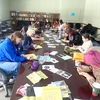SUNY Fredonia's chemistry department will receive $20,000 this year and $25,000 for the next four years as a polymer research affiliate in a prestigious, multi-million dollar research center established at Case Western Reserve University by the National Science Foundation.
Dr. Kumler and Dr. Cheryl Campo, who joined Fredonia's chemistry department this year to fill the teaching position left by Dr. Kumler's recent retirement, are coordinating and planning Fredonia's involvement with CLIPS. Dr. Kumler has been researching and publishing in the area of polymer research for over three decades. Dr. Campo has a master's degree in polymer science from the University of Connecticut and concentrated on polymer studies during her doctoral work at Case Western Reserve University, which she completed this year.
Case has a number of other partners in the center, including Ph.D.- granting institutions such as University of Texas at Austin, Fisk University, and the University of Southern Mississippi. Fredonia is one of four institutions which primarily serve undergraduate students. The others are Ohio Northern University, Rose-Hulman Institute of Technology, and Rochester Institute of Technology.
Non-collegiate partners are the Cleveland Municipal School District and the Naval Research Laboratory in Washington, DC.
The director of the center is Anne Hiltner, the Herbert Henry Dow Professor of Science and Engineering in Case’s department of macromolecular science and engineering.CLIPS will receive approximately $19 million from NSF over the first five years. The lifetime of a science and technology center established by NSF is usually 10 years with a funding of around $40 million.



